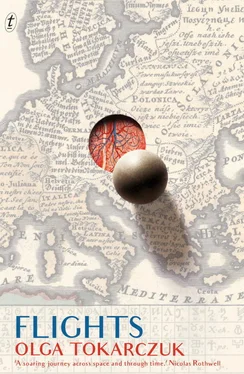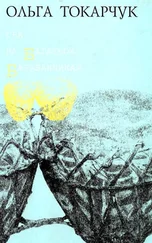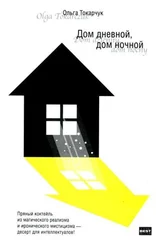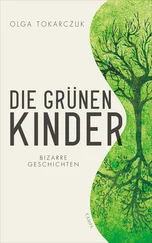He’d get up every morning, wash his face with cold water and arrange his grey beard with his fingers. Then he’d put on the dark green uniform of the United Northern Ferry Company and go on foot to the port where he had docked the previous evening. Shortly thereafter someone from the ground service, Robert or Adam, would open the gate, and straight away the first cars would get in line to drive up the iron ramp and onto Eryk’s ferry. There was always enough room for everyone, and it also happened sometimes that the ferry was empty, clear, light as a daydream. Then Eryk would sit in his cabin, suspended on high in his glassed-in stork’s nest, and that other shore would seem so close. Wouldn’t it be better to build a bridge than make people go back and forth and pester him this way?
It was a question of states of mind. Each day he could choose between two. One was sensitive, quick to take offense – he would be sure he wasn’t as good as anybody, that he was lacking what everyone else had, that he was a deviant of some sort who didn’t even know, for God’s sake, what was wrong with him. He’d feel isolated, lonely, like a child sent to his room looking out the window at his peers as they played happily. That fate had intended him for a small supporting role in these chaotic human peregrinations across land and sea, and now, since settling on this island, this episode had turned out to be a minor one, as well.
The other state of mind strengthened his conviction that actually he was better, unique, exceptional. That he was the only one who sensed and understood the truth, that only he was capable of being exceptional. And he sometimes managed to spend a number of hours in this elevated self-esteem, and even days, when he felt, let’s say, somehow happy. But then it faded, like intoxication. And by way of a hangover there appeared the terrifying thought that in order to seem like a person worthy of respect, he had to continually fake it in these two ways and that – worst of all – someday the truth would come out; it would be revealed that he was no one.
He was sitting in his glassed-in cabin observing the loading of the first morning ferry. He saw people he’d known a long time from the little town. Here was the R. family in their grey Opel – the father worked at the port, the mother in the library, while the children, a boy and a girl, were still in school. Here were four teenagers, school kids, who would take their bus on the other side. And here was Eliza, the nursery school teacher, with her little daughter, whom she was of course taking with her to work. The little girl’s father had disappeared all of a sudden two years earlier and had never been heard from since. Eryk suspected he must be fishing for whales somewhere. Here was old S., who had something wrong with his kidneys; twice a week he had to take the ferry to go to the hospital for dialysis. He and his wife were trying to sell their little dwarf-like wooden house and move closer to the hospital, but for some reason or other they hadn’t managed to do so. The truck from Organic Foods was going to stock up on products on the mainland. Some black foreign car, probably guests of the Director. The yellow van that belonged to the brothers Alfred and Albrecht, two stubborn old bachelors who continued to raise sheep on the island. A couple of cyclists, numb with cold. The delivery vehicle from the car shop – must have been going for parts. Edwin waved to Eryk. You could recognize him on any island of the world – he always wore checkered shirts lined with artificial fur. Eryk knew them all, even the ones he was seeing for the first time – he knew why they had come here, and knowing the aim of a journey, you know enough about a person.
There were three reasons for coming to the island. Reason One, because you simply lived here; Reason Two, because you were a guest of the Director; and Reason Three, because of the windmill, to have a picture of yourself taken with it in the background.
The ferry took twenty minutes. In that time some of the passengers got out of their cars and lit a cigarette, even though they weren’t allowed to. Others stood at the railing and just looked out at the water, until their rocking vision finally hooked onto the other shore. Soon, excited by the smells of the mainland, with all their incredibly important tasks and obligations, they would disappear onto the little streets by the waterfront, ebbing away like the ninth wave that reaches furthest and soaks into the ground and never returns to sea. Others would come to take their places. The veterinarian in his elegant pick-up; he earned his living by spaying and neutering cats. A field trip to investigate the flora and fauna of the island for a class on the natural world. A delivery of bananas and kiwis. A television crew coming to interview the Director. The G. family, returning from a visit to the grandmother. Another suntanned couple of cyclists would replace the first.
During loading and unloading, which took almost an hour, Eryk would smoke a few cigarettes and try hard not to give in to despair. Then the ferry would return to the island. And so it would go eight times, with a two-hour break for lunch, which Eryk always ate in the same little place. One of three places around there. After work he’d buy potatoes, onions and bacon. Cigarettes and alcohol. He’d try not to drink until noon, but by the sixth trip he would already be smashed.
Straight lines – how humiliating they were. How they destroyed the mind. What perfidious geometry, how it makes us into idiots – there and back, a parody of travel. Going forth merely in order to return again. Speeding up just to put on the brakes.
So it was, too, with Eryk’s marriage, which had been brief and turbulent. Maria, a divorcée, worked in a shop and had a young son who went to a boarding school in the city. Eryk moved in with her, into her nice, cozy little house with its enormous television. She had a slim figure, with somewhat generous contours, light-coloured skin and tight-fitting leggings. She soon learned to serve his potatoes with bacon and started adding marjoram and nutmeg to them, while he threw himself into chopping wood for their fireplace on his days off. It lasted a year and a half; after a while the never-ending noise of the television started to wear him down, its gaudy illumination, the rag by the mat where you had to leave your muddy boots, and that nutmeg. After he got drunk a few times and swore at her like a sailor, finger raised, she threw him out of the house, and shortly thereafter she moved to the mainland, to be near her son.
•
Today was 1 March, Ash Wednesday. When he opened his eyes, Eryk saw the grey light and the sleet falling, which would leave blurred tracks on the windows. He thought of his old name. He’d almost forgotten it. He said it out loud, and it sounded as though he were being called by some stranger. He felt the familiar pressure in his head after yesterday’s drinking.
Because it must be noted that Chinese people have two names: one given by their families, used to summon the child, scold and punish him, but also the basis for affectionate nicknames. But when the child goes out into the world, he or she takes another name, an outside name, a world name, a personage-name. Donned like a uniform, a surplice, a prison jumpsuit, an outfit for a formal cocktail. This outside name is useful and easy to remember. From here on out it will corroborate its person. Best if it’s worldly, universal, recognizable to everyone; down with the locality of our names. Down with Oldrzich, Sung Yin, Kazimierz and Jyrek; down with Blażen, Liu and Milica. Long live Michael, Judith, Anna, Jan, Samuel and Eryk!
But today Eryk answered the call of his old name: I’m here.
No one knew that name, so I won’t say it, either.
Читать дальше












